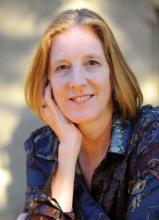"In the comfort of the Gottmans’ own island home, learn research-based tools for building and maintaining relationship intimacy. Have you ever planned a wonderful romantic vacation, complete with a lovely room, candle-lit dinners, and white sand beaches, only to have your dream become a nightmare when tense quarrels and silence spoil the sunset? We have been listening to painful stories like these for nearly 35 years.
"Now you can restore your relationship while having a world-class romantic holiday. In an exclusive, small group two-day couples retreat (there will be no more than six couples in each retreat), we offer you research-based skills for deepening intimacy, managing conflicts, and enhancing your sense of shared meaning in a private, comfortable, and beautiful setting."
That is a description from the brochure and website of the Gottman Relationship Institute, a marital therapy retreat conducted on Orcas Island off the coast of Washington, and run by an academic who has crossed over to the public sector: John M. Gottman, Ph.D.
Dr. Gottman is a psychologist who has received National Institute of Mental Health grants and numerous awards, and has authored or coauthored 119 academic articles and 37 books. In addition, Dr. Gottman is cofounder with his wife, Julie Gottman, also a Ph.D psychologist, of the Gottman Relationship Institute in Seattle. (Another personalized marriage counseling retreat is called Marriage Quest.* This one is held in Cabot, Vt., and is run by Israel Helfand, Ph.D., and his wife, Cathie Helfand, M.S. The Helfands are marriage counselors and sex therapists who have been working together with couples since 1983.)
We are all familiar with Dr. Gottman’s relationship interaction ratios. In happy couples, there are 20 positive interactions to 1 negative interaction, in conflicted couples the ratio is 5 to 1, and in soon-to-divorce couples the ratio is 0.8 to 1. Unhappy couples have a filter that screens out positive events and makes even neutral events negative. Happy couples have a filter that screens out negative events and makes neutral events positive.
Dr. Gottman’s research involves a quantitative mathematical approach to understanding the changes in the marital dyad and the relative influence that each has on the other. This model predicts changes in the relationship of a couple in his research laboratory.
His relational ratios and equations are now being applied to the dynamics of psychotherapy (Cogn. Neurodyn. 2011;5:265-75). The influence that the client has on the therapist and the influence that the therapist has on the client are mathematically mapped. Without going into the mathematical computations, I can say that the findings are that the therapist or client who is most responsive to the other ends up being the most positive, often through a series of emotional ups and downs. In other words, being positive, either on the part of the therapist or the client, yields positive outcomes. However, being too responsive to clients produces mediocre outcomes, and being negative to patients produces negative outcomes.
The authors do not claim any major theoretical advances. But they do believe that understanding the dynamic emotional states that exist between the therapist and the patient holds clues to the good therapeutic relationship.
For their part, Dr. Gottman and his wife certainly have balanced out the positives with the negatives when it comes to work and lifestyle balance. They’ve got an island home, the gratification of a successful practice, the avoidance of the health care system, and a continued ability to influence the field of relational psychology. In fact, he has developed a Relationship Vision Quest based on extensive research laboratory findings. One critical question has always been: Does this research translate into clinical practice?
Dr. Gottman now has his utopian island where he can put his research to the test – and he is looking for volunteers.
This column, Families in Psychiatry, appears in Clinical Psychiatry News. Dr. Heru is an associate professor of psychiatry at the University of Colorado at Denver, Aurora. She has been a member of the Association of Family Psychiatrists since 2002 and currently serves as the organization’s treasurer. In addition, she is the coauthor of two books on working with families and author of numerous articles on this topic.
*Correction, 1/9/2012: An earlier version of this column inadvertently referred to the Gottmans' retreat as Marriage Quest.


